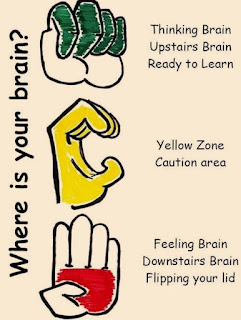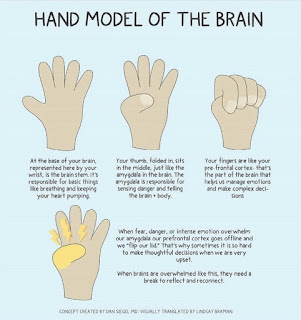Flipping Our Lid
We all have a sensory system which enables us to process everything we see, hear, touch, smell and feel throughout the day. On a good day we can enjoy and easily process the sensory experiences that come our way. We might enjoy the smell of flowers or spending time chatting with some friends. We can generally brush off intrusive irritations like a neighbour cutting down a tree or the sound of a baby crying or children making noise. We might be able to cope with an itchy label in our clothes for a while. We can filter things out so they don’t annoy us too much and we can reason with ourselves. We have what’s called a “window of tolerance”. Our tolerance window is where we feel comfortable in ourselves, we can live, love and learn whilst feeling ok. Our window might change size from day to day or even moment to moment depending on what’s going on. For children who have developmental trauma and neurodevelopmental difficulties their window of tolerance might be the size of a postage stamp much of the time which causes them tremendous difficulty in day to day life.
When we are in sustained stressful situations our sensory system becomes more sensitive. We might hear things more acutely or feel the pain of bumping our body more than we might at another time. We might start to find it harder to brush off other irritations like a driver cutting us up or someone being rude or the children not being ready for school and we’re running late. Our brain becomes more and more stressed and we can find it harder and harder to manage those minor irritations and eventually we get angry and flip our lid. In a rush, the feelings overtake us. We find it hard to access our logical, thinking, brain. We might even find it hard to know why we’re angry in that moment - it’s all just got too much. Our breathing gets faster as our body goes into fight/flight/freeze or collapse. Those are the moments when we might flip our lid.
Dan Siegel describes the process of flipping our lid by using our hand to show the three key processing parts of the brain. It’s really helpful to do the actions yourself as you read the following description:
I think we can all benefit from learning this visual technique and understanding the process our brain goes through when we feel emotions.
Currently we have a lot of lid flipping going on in our house. I was lucky enough to recently attend an 8 week course with my local CAMHS service on developmental trauma although it appears just attending the course doesn’t magically resolve the problems. One of the first things our trainers told us was that we, the parents, can bring about the biggest changes for our children. When we seek help we want someone else to come and fix the difficulty for us and our children but because we are with our children a lot (or in my case nearly all day long) we are best placed to learn the techniques to help our children. I felt enormous pressure and I’ll admit to some irritation when I heard this because it’s hard being all things to everybody all the time. My own sensory system gets put under tremendous pressure when absorbing the responses to the daily stress my children experience. I’ll secretly admit they’re right though,
Pip talks all day long. From the moment his eyes open until they close at the end of the day he is giving a running commentary on everything in his brain or he’s making noises. He squeaks, he hums, he makes a noise that sounds like the Swedish Chef from The Muppets but speeded up. I kid you not, you’d have to hear it to believe it. He also calls the cat by his nickname “Booooossse” in the highest pitch you can imagine. My brain literally wants to explode at times because, bless him, his anxiety and hyperactivity triggers my own sensory overload too. I spend a lot of my day rebalancing myself and reframing everything that is happening around me. Pip will only sit still if he’s on the tablet (or he’s asleep). The rest of the time he’s bouncing, twirling, sliding down the stairs, talking to me at 100mph, asking questions, wanting to know everything immediately and he can’t wait. Pip has a lot of anxiety about a lot of things. School being one of them. He’s waiting for an assessment with CAMHS which I’m hoping will be very soon. I’m not a fan of medicating children but I feel he needs something to help him feel calmer inside. We don’t know to what extent this is all developmental trauma or also ADHD or even ASD. The trouble is developmental trauma can look like all this things. His sensory system is constantly looking for feedback. His attachment is very anxious and fragile. He’s had a lot happen in his young life. Unpicking it all will be challenging. At the current time his anxiety quickly spills over into anger and frustration and flipping his lid happens several times a day at least. He feels shame very easily so telling him off is problematic because a shame response means a meltdown. When I take him to school he will often hide under the table and become preverbal when he knows I’m going to sit in the car for a while.
Trying to ensure I stay regulated throughout the day is a challenge.
Katie is different in that these days she spends a lot of time in her room. She doesn’t want to engage with me. I have a lot of concerns about how she’s feeling. She bottles things up but eventually they do come out. When I try to speak to her generally however she shifts gears from freeze to anger in seconds. Most of our attempted conversations involve her screaming at me at a very loud pitch. It can feel quite a shock. She doesn’t think she should receive any guidance or parenting from me and will react very aggressively to my involvement if I feel that she needs to do something differently. I find it harder to keep regulated with her because she can become quite threatening. She’s going to be starting some funded Occupational Therapy sessions soon which I really hope can help her. I think she has a lot inside that needs to be unlocked but equally she struggles with the overlapping diagnoses of FASD/ASD/PDA and ADHD along with developmental trauma. She isn’t often age appropriate in her responses and isn’t emotionally where she should be for her age but she wants to be like everyone else she sees her age and that puts her at risk.
So three people in one house all struggling with sensory regulation. I do a fairly good job these days of keeping calm on the outside. I work hard at regulating myself on the inside but I admit it’s a challenge. I barely have time to rebalance from one outburst before the next one comes along. It’s exhausting constantly rebalancing and I find that my first reaction to stress is freeze. I’ve learned to utilise our iPad time to allow myself some freeze time with Pip. We play a game together and I can calm myself down and re-engage with the world. We need a lot of support to help the children feel better in themselves. We were at the point of needing intervention before the pandemic hit. Now, two years on, were at a level of desperation I’ve not reached before. Our Social Worker has tried and tried to get support in place which was thwarted by the pandemic and other issues. I can’t fault her at all for trying. The world stopped but our children didn’t. They can’t do therapeutic work around their attachment via zoom link. They couldn’t even do any education via zoom link, that was far too stressful. There is hope on the horizon as I’ve mentioned in previous posts. I almost don’t dare to hope because it feels like it might never come.
Watch this space, as they say….






We have a 12 year old who sounds like your beautiful Katie (our granddaughter). Interested in knowing if you’ve made any progress since this was published? ❤️. Feeling defeated
ReplyDeleteHi, there, thank you for taking the time to comment here. I am sorry that you are experiencing difficulties. Early puberty was a time of huge turmoil for us here. Katie struggled enormously due to the impact of puberty on all her overlapping neurodevelopmental challenges. Katie is now 16. She hasn't been in school for 2 years now and has developed POTS too. I will say that the key thing that has helped Katie has not being in school. She crashed, totally burned out. He emotional dysregulation up until she was around 14.5 was huge. Going on the birth control pill helped her a lot to calm and balance all her emotions. She is now on variety of medications that seem to be helping her. The lockdowns ironically helped her because school was taken out of the equation. She spiralled though and got into a lot of different difficulties that took a lot of unravelling. I will say that she is currently much more balanced emotionally. She is maturing and better able to reflect. Her empathy skills are developing more now. We are so much closer than we were when I wrote this post. We can laugh together and she has a good sense of humour. Her world is confined to our home though and that is something I really hope to help her change. She has a lot of neurodevelopmental challenges so I am grading on a huge curve compared to other people. She suffers from ridiculous amounts of anxiety which affects us all here. We are in a better place in many ways though and I no longer fear for my safety. I have learned to parent very differently and embrace a very different type of life than the one we used to have. That isn't easy and it's very restricted. We are making progress though and I can see incrementally we are slowly shifting in the right direction. If you need any more specific support please feel free to email me at threebecomefour@gmail.com and I will do my best to offer support. Gem
Delete